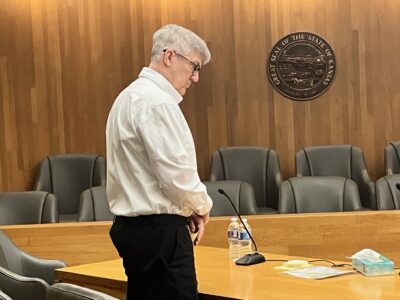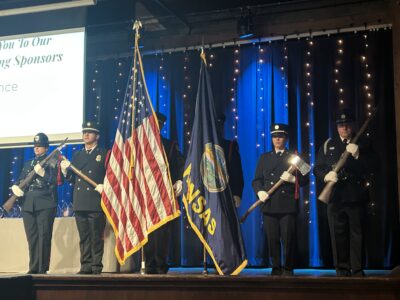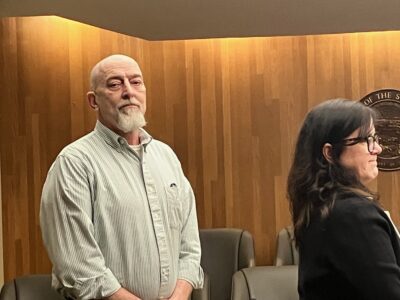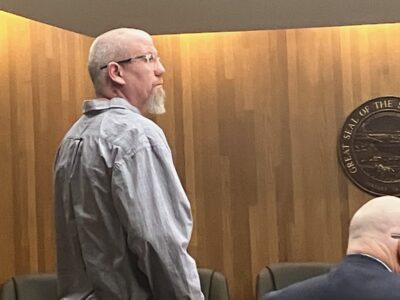Albert Wilson gets a new trial in Lawrence rape case; judge says defense attorney failed to review thousands of text messages

photo by: Sara Shepherd
Albert N. Wilson listens to his attorney give closing arguments in his trial on Thursday, Jan. 10, 2019, in Douglas County District Court.
UPDATED 2:54 P.M., MARCH 16, 2021
A Douglas County judge on Tuesday granted a new trial to Albert Wilson, who was convicted of rape in 2019.
Wilson sought a new trial on the basis that his trial attorney, Forrest Lowry, provided ineffective assistance of counsel. Judge Sally Pokorny agreed in her ruling Tuesday, noting she found that questions that could have been raised from thousands of text messages that had not been used as evidence in the trial could have influenced the jury’s decision.
“The court’s confidence in the jury’s verdict is undermined by Mr. Lowry’s failure to review text messages,” Pokorny said. “It is my firm belief that if a jury knew of the information contained in the 2,000 text messages taken from the victim’s phone, there is a substantial likelihood the outcome of this case would have been different,” she added.
Pokorny said she will soon order Wilson transferred from a prison in Hutchinson back to the Douglas County Jail for a new bond hearing and the setting for a new trial. Wilson’s next court appearance is scheduled for March 23.
A jury in January 2019 convicted Wilson, now 25, of one count of rape in connection with a Sept. 11, 2016, incident. Wilson has been serving a 12.5-year sentence.
As the Journal-World has reported, the victim in the case, a girl who was 17 at the time, met Wilson at The Hawk, a popular bar near the University of Kansas campus. She testified that she was drunk and that Wilson, then a 20-year-old KU student, lifted her skirt and assaulted her at the bar and then walked her to his house a couple of blocks away, raped her, then walked her back to the bar.
Wilson was convicted of rape for the incident at the house, but the jury hung on the incident at the bar.
On appeal, Wilson has been represented by two attorneys, Michael Whalen and Josh Dubin. Based on Whalen’s motion, the Kansas Court of Appeals agreed on Feb. 6, 2020, to send the case back to Douglas County District Court for Pokorny to decide whether Wilson should get a new trial.
In their arguments, Dubin and Whalen came to the conclusion that the case came down to the girl’s credibility. That was key in a number of specific points they made, but one particular focus was on data from the girl’s phone. If Wilson’s appointed attorney, Lowry, had realized he had certain additional evidence, including text messages and photos from the girl’s phone, he could have more effectively cross-examined her and others who testified, they wrote.
After the hearing, Whalen told the Journal-World he was “overwhelmed and absolutely thrilled” with Pokorny’s decision. He said he and Dubin will continue to serve as Wilson’s defense in the new trial.
“The evidence and information that came from this hearing will make a difference in how the case is approached,” he said. “We presented a strong case and the judge agreed with our argument. We’re just very happy with the outcome today.”
Prosecutors had argued against the granting of a new trial, and said they did not believe the text messages warranted one.
Kate Duncan Butler, assistant district attorney, wrote in an argument to the court that “The text messages discussed at the hearing seem to indicate that (the girl) had a bit more experience with alcohol and mental-health treatment than she revealed to” the forensic psychologist who evaluated her and diagnosed her with post-traumatic stress disorder.
However, Butler questioned whether some of the messages would have even been admissible had Lowry attempted to use them during Wilson’s trial. The admission of messages about the girl’s personal life months before the incident “dramatically increases the likelihood of blaming and shaming her as the victim,” Butler wrote.
“It is also unclear how those messages are relevant now, except perhaps to paint (the girl) as dishonest,” she wrote.
But Pokorny noted Lowry testified his defense strategy came down to attacking the credibility of the girl and her recollection of the incident. Calling it a “he said, she said” case, Pokorny said the text messages are directly related to the credibility of the testimony provided by the girl and the diagnosis of the psychologist, who also had not seen the text messages.
“Those messages went directly to the credibility of the victim’s self reports to (the doctor), of which his diagnosis was based,” Pokorny said. “We know based on his testimony … that he had not reviewed all of the evidence,” Pokorny said of the psychologist.
Both Douglas County District Attorney Suzanne Valdez and Deputy District Attorney Joshua Seiden appeared in court for the prosecution during the hearing. Valdez said in a news release that although Wilson’s conviction and “all evidentiary proceedings” occurred before she took over as DA, she and Seiden would be reviewing the court’s ruling and the relevant materials in the case.
“As in all cases, this Office remains committed to pursuing equal and equitable justice for all affected parties,” Valdez said in the release.






